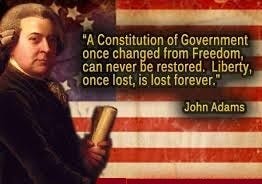Lie #10 — The Constitution Was The Creation of “Elites” Protecting Their Financial Interests
The movement for the Constitution . . . was originated and carried through principally by four groups of personal interests which had been adversely affected under the Articles of Confederation: money, public securities, manufacturers, and trade and shipping. — Charles A. Beard, An Economic Interpretation of the Constitution of the United States
In fact, [the Founding Fathers] did not want a balance, except one which kept things as they were, a balance among the dominant forces at that time. — Howard Zinn, A People’s History of the United States
Charles Bead’s famous book applying economic determinism to the revolutionary ideas of the U.S. Constitution is something of a dead issue today among most historians, even those on the left. Unfortunately, the “filter down” process of instruction from professors to high school teachers lingers many years after the concepts are outdated. In fairness, Beard himself admitted, “If anywhere I have said or written that ‘all history’ can be ‘explained’ in economic terms, I was then suffering from an aberration of the mind. Rejecting the notion that his interpretation sprang from “Marxian theories,” Beard nevertheless claimed (rightly) that “whoever leaves economic pressures out of history or out of the discussion of public questions is in mortal peril of substituting mythology for reality. . . .
As a refresher, Beard examined the economic and financial interest of those members of the Constitutional Convention, finding them to be (surprise!) men of substance. He also examined the ratification conventions and claimed they were similarly the domain of small groups of “propertied” men. Howard Zinn expressed the basic premise with more disgust, but with the same essential economic-determinist verve:
The Constitution, then, illustrates the complexity of the America system: that it serves the interests of a wealthy elite, but also does enough for small property owners, for middle-income mechanics and farmers, to build a broad base of support. The slightly prosperous people who make up this base of support are buffers against the blacks, the Indians, the very poor white. They enable the elite to keep control. . . .
The obvious small problem with such silly comments is that (a) Zinn himself has become one of the “wealthy Elites” by trashing the Founders; (b) the “American System” (if it was so designed as he and Beard claimed) was so anemic and poorly conceived that critics such as himself obviously evaded its restrictions; and (c) within eighty-five years of its writing, a president, using the Constitution as a guide, liberated the very blacks the document was supposed to keep in their place.
As any good student of history knows, of course, Forrest McDonald has dissected and reversed much of Beard’s original study in his book We the People. Reassessing Beard’s definitions of what constituted “wealth” and property, McDonald found “the details [of Beard’s argument] to be incompatible with the broad outlines he sketched,” and said the way in which Beard asked the question was “meaningless.” The Philadelphia convention acted neither as a concerned economic group nor as the product of some abstract causes of class struggle. Instead, McDonald found, too many of the interest groups were indifferent to the issues of others and were never aligned toward similar strategies. More significant, the political interests of all states were represented, but not the economic interests. The Constitution, it had to be concluded, was about ideas, not money.
To anyone except, perhaps, Zinn and Matt Damon’s character in Good Will Hunting, this would be obvious, especially considering that economic historians (who would love nothing better than to prove the primacy of economics in everything) have completely rejected economic motivations as the main cause of the American Revolution. For the field of economic history, this has been a dead subject for more than two decades, but because of the ongoing economic determinist indoctrination of high school teachers, it is worth a revisit here.
People have fought over money in the past. Americans have fought over money. But look deep enough, and in most cases you’ll find that the real battle is over ideas, as it was in the ratification of the U.S. Constitution.
There’s plenty more of this debunked lie in the book — 48 Liberal Lies About American History… So check it out worth the read and educate your friends…





